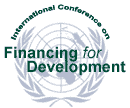
Department of Public Information - News and Media Services Division - New York
18-22 March 2002
19 March 2002
 |
International
Conference on Financing for Development Department of Public Information - News and Media Services Division - New York |
|
| Monterrey, NL, Mexico 18-22 March 2002 |
19 March 2002 |
|
PRESS BRIEFING BY MEXICAN HEALTH, EDUCATION AND SOCIAL DEVELOPMENT OFFICIALS
Economic development was the outcome of social development and investments by countries in areas such as education and health, Mexico's Secretary of Social Development, Josefina Vazquez, told reporters this afternoon at a press briefing. Joining Ms. Vazquez was Education Secretary Reyes Tamez and Health Secretary Julio Frenk.
Mexico, she said, was implementing a new vision of social development under President Fox and working in a cross-sectoral way, which had not been seen before in her country. The new strategy focused on equity and shared responsibility. The major challenge facing Mexico was a social transition, which required reform of social structures and changes in social policies. Mexico had come to the Conference to find healthier financial schemes. Any economic policy decision was a social policy decision, she stressed.
Secretary Tamez said that the lack of equity regarding education in Mexico was reflected more so at levels of higher education. There was 92 per cent enrolment at the basic education level, from the ages of 6 to 14. Only 20 per cent of the age group at the higher education levels was enrolled. Only 1 per cent of the indigenous population and 3 per cent of the rural population had access to higher education. Since last year, the Government had begun grant and scholarship programmes for the middle and higher levels to assist those who could not go on to higher level of education. All of that was taking place within a new government strategy based on a philosophy of greater responsibility, which brought together the three secretaries in a coordinated fashion.
Countries that invest in their people were those that had economic growth, stated Secretary Frenk, as he highlighted the prominent role played by health issues in the Conference. The Millennium Summit goals regarding health were very specific, such as reducing under-five mortality by two thirds. Today, there was tremendous inequity in the financing of health. At one extreme were countries such as the United States, and at the other were countries like Somalia, where under $12 were invested per person. That, he emphasized, was a genuine threat to global security.
Asked what lessons Mexico could draw from the Conference, Secretary Vazquez said Mexico had come to the Conference with an important role to play. It was coming, not only as a transition country and as a member of the Organization for Economic Cooperation and Development (OECD), but also acknowledging the backward stage in which many Mexicans lived. President Fox had said that Mexico was coming to demonstrate the need for support and cooperation, as a country committed to closing the inequity gap. Social development, she said, was a right for all Mexicans.
Secretary Tamez stated that while Mexico had already achieved significant economic development, it still lagged in several areas. Although it was the ninth largest economy in the world and the largest in Latin America, it could not be satisfied with that. One of the problems was that Mexico had social support programmes, which did not effectively enable people to move forward and be socially mobile.
Replying to a question on drug abuse at the school level, Secretary Tamez said that efforts had been made to try to address the problems of drugs and violence at the secondary level. A change in attitude had been seen among young people who had undergone special courses on citizenship and law.
On ensuring the availability of information in small communities, Secretary Vazquez said that there were some 150,000 localities in Mexico, and it was difficult to provide an adequate social security network. Some 3.5 million families lived in small communities. Many families did not move to seek better opportunities because they had no ownership over their property. The Government was working on ensuring ownership rights to enable people to prosper.
Secretary Frenk added that among the strategies used to reach small communities was the development of local health promoters with mobile units going from one area to another. Another was the use of telecommunications to link the most remote communities.
Press Conferences
Conference News